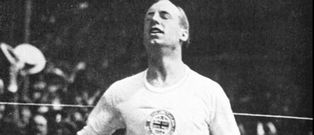
On the following Tuesday, Liddell and Abrahams both qualified for a place in the two hundred-meter final, to be held on the following day. Eric became the first Scot ever to bring home a medal in that race, winning the bronze. No one from Great Britain had ever placed higher. Eric went on to compete in the four hundred-meter race, joining runners from Canada, United States, and a fellow Briton named Guy Butler in the final. Just prior to the race Liddell went down the line, shaking his competitors’ hands in a ritual that he had made familiar over time. At the gun Eric bolted into a three-meter lead. As the race progressed, Fitch, the American, began to close in on the Scot, but Liddell increased his speed. As he crossed the finish line with a five-meter lead, his head cocked back and arms flailing the air, Eric brought home the gold medal. After an explosive roar from the British spectators, a hush finally fell over the crowd as they waited for the official time. The cheers erupted again as it was announced that Eric Liddell had set a new world record of 47.6 seconds.
Eric Liddell was a sprinter as an Olympian, but the young believer from Scotland, just twenty-two years of age during the Eighth Olympiad, provides a powerful example of one who ran the Christian race with a marathoner’s endurance. Based on his commitment to Christ, he “threw off” the opinions of both the general public and the powerful, giving up the opportunity for glory in the hundred meters, a race for which he had trained for years. Liddell endured not only in the months prior to the Olympic games, but afterward embarked on a career as a missionary to China, where he died eventually in a Chinese prison. His life evidenced a long-term focus on Christ as his reference point. In all things he took his cues from the Lord Jesus, who was his example, sustainer, and guide. Because he had thrown off hindrances to his spiritual race and had chosen a path of perseverance, Liddell had a clear view of Christ and his call, and he abides as a strong example of the Christian life lived nobly.
As we look to those like Eric Liddell, who looked to Christ for how they should run the race of life, we should reflect on what we need to “throw off.” There may be encumbrances that are not bad or sinful in and of themselves but should be evaluated in light of their effect on our running the race. Certain possessions, hobbies, patterns of life, or even people can occupy us in a way so as to cool our hearts to Christ.
Reading the newspaper or watching a television program, for example, may be minor considerations unless they distract us constantly from reflection on God’s Word or reading edifying literature. An unmarried person may take great pleasure in the company of a new romance, but such a relationship must be weighed in light of its effect on one’s Christian commitment. A sport such as golf might be a source of physical exercise and fellowship but can also cause a person to neglect his or her family. We should assess how we are responding to the pull of popularity, position, or place in our given life occupations—none necessarily bad inherently, but potentially stunting to spiritual development if they are out of line in what should be Christian priorities." [1]
 RSS Feed
RSS Feed
